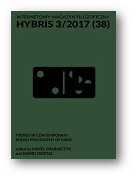What does the sensory apparatus do when there is nothing to perceive? The salience of sensory absence
What does the sensory apparatus do when there is nothing to perceive? The salience of sensory absence
Author(s): Katarzyna KobosSubject(s): Psychology, Experimental Pschology
Published by: Wydawnictwo Uniwersytetu Łódzkiego
Keywords: embodied predictionism; representation; embodiment; sensory deprivation; absence of sensory stimuli; sensory perception;
Summary/Abstract: This study aims to bring out the explanatory potential of embodied predictionism versus passive feed-forward model of sensory stimulation in the pursuit of a parsimonious naturalist account of sensation as a salient feature and an end point of conscious experience. Theoretical approaches towards sensory experience are tested against specific scenarios of the absence of observable or palpable qualities including but not limited to the thought-experimental phenomenon of negative synesthesia at the conclusion of the argument. . Predictionism is first explored in its own right only to be found insufficient to do justice to the actual mechanism behind full-blown immediate perception. A case is made for the soundness of predictionism reconciled with the doctrine of embodiment.
Journal: Internetowy Magazyn Filozoficzny HYBRIS
- Issue Year: 2017
- Issue No: 38
- Page Range: 42-57
- Page Count: 16
- Language: English

